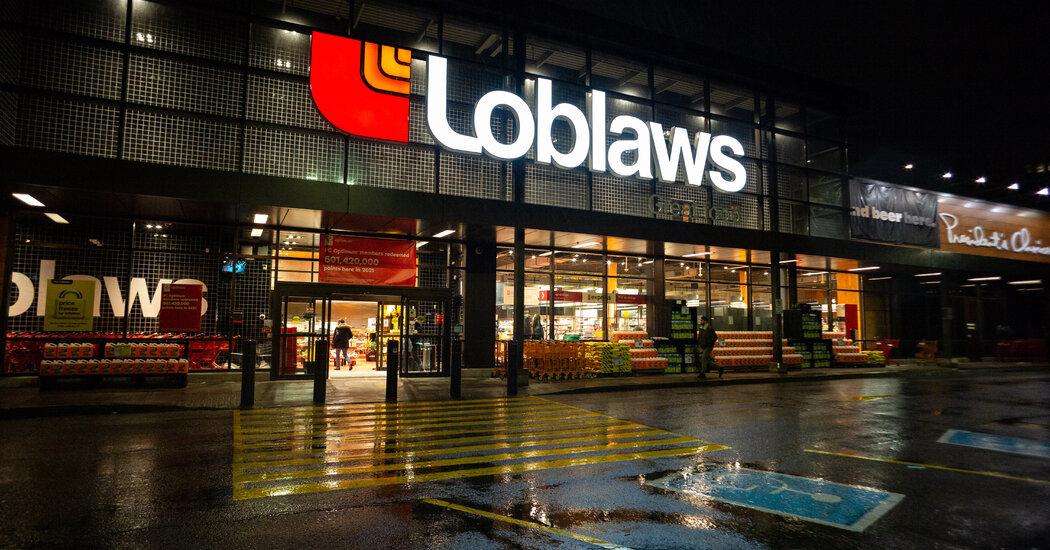
High Food Prices Rile Up Canadians
A case of sticker shock in the poultry aisle of a downtown Toronto grocery store owned by Loblaw Companies, Canada’s largest food retailer, caused a backlash on social media about what, and perhaps who, is behind the rise in food prices.

Loblaws, a grocery chain operated by Loblaw Companies, Canada’s largest food retailer.Credit…Ian Austen/The New York Times
Accusations of profiteering were directed toward the grocer and its chief executive and chairman, Galen Weston Jr., in an overwhelming number of comments responding to a Twitter post by Siobhan Morris, a Toronto broadcast reporter who shared her picture of a pack of five chicken breasts. The price: 37 Canadian dollars.
The company later clarified that those chicken breasts were part of its more expensive premium-quality line, but the explanation had little effect on the outrage, underscoring how food retailers have become a lightning rod for Canadian discontent.
“We love to hate our grocers,” said Mike von Massow, a food economy professor at the University of Guelph in Ontario. “We particularly love to hate Galen Weston, and I think that’s part of the cost of being the biggest grocer, and it’s also part of the cost of being in your own ads.”
(Mr. Weston is a familiar face to many Canadians, regularly appearing in commercials for the company, founded by his great-grandfather, and its many brands.)
“While it’s easy to get angry at the grocer, there’s very little evidence that the grocers are actually taking advantage of the situation,” Professor von Massow told me.
Inflation F.A.Q.
What is inflation? Inflation is a loss of purchasing power over time, meaning your dollar will not go as far tomorrow as it did today. It is typically expressed as the annual change in prices for everyday goods and services such as food, furniture, apparel, transportation and toys.
What causes inflation? It can be the result of rising consumer demand. But inflation can also rise and fall based on developments that have little to do with economic conditions, such as limited oil production and supply chain problems.
Is inflation bad? It depends on the circumstances. Fast price increases spell trouble, but moderate price gains can lead to higher wages and job growth.
How does inflation affect the poor? Inflation can be especially hard to shoulder for poor households because they spend a bigger chunk of their budgets on necessities like food, housing and gas.
Can inflation affect the stock market? Rapid inflation typically spells trouble for stocks. Financial assets in general have historically fared badly during inflation booms, while tangible assets like houses have held their value better.
In one example, a pricing dispute between Loblaw and PepsiCo Inc. led to the temporary disappearance of some Frito-Lay Canada chips and snack products from grocery shelves after the supplier requested higher costs and Loblaw pushed back.
A similar combination of factors affecting food prices globally, including the war in Ukraine, labor shortages, gas prices and supply chain pressures exacerbated by pandemic disruptions, has played into Canada’s food inflation as well. Local extreme weather conditions also contributed, as seen during the Western Canadian drought in 2021 that decimated wheat crops and pushed desperate Manitoba farmers to save their cattle herds.
Grocery profits are up, but a recent study from Dalhousie University in Halifax showed profit margins over the last four years have remained consistent.
“The fact that margins haven’t changed means that we probably haven’t seen prices stretched above the cost increases,” Professor von Massow told me.
Some of the wrath and mistrust toward Loblaw could stem from the company’s admission in 2017 to playing a role in Canada’s bread price-fixing scandal that lasted more than a decade. Adding to that, the company recently announced a temporary price freeze on its popular in-house line of No Name products, which was dismissed by consumer advocates as a gimmick.
An investigation by the Competition Bureau, a government agency, is ongoing. In an effort to make recommendations to the government that would improve grocery store competition, the agency announced in October that it was starting a new study on the sector, while making clear the work was “not an investigation into specific allegations of wrongdoing.”
The study will conclude in June, but Professor von Massow said he was not optimistic that the findings would have a real effect on food inflation, citing the study’s short timeline and the missed opportunity to investigate how grocers wield their market power over suppliers.
“If governments want to make a difference, rather than pointing fingers at grocers, they should find ways to ease the pressure for those people who are making explicit decisions between eating and paying rent,” Professor von Massow told me.
Food prices have risen at a higher rate than consumer inflation since late 2021, according to a recent report by Statistics Canada, the national census agency. The 11.4 percent yearly price increase recorded in September food costs represents the fastest growth Canada has seen since 1981, and that increase held into November.
In Europe, the price of food climbed to 13.6 percent over the year through November in 19 countries that use the euro as their currency, outpacing Canada’s increases.
[Read: Bread Prices Skyrocket as Inflation Grips Europe]
Researchers at four Canadian universities predict that food prices here will rise in 2023 by 5 to 7 percent overall, with more notable price increases among vegetables, dairy products and meat products.
These forecasts, published in
